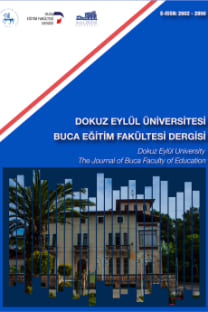yabancılaşma, anomi, belirsizlik, normsuzluk, kültürel yabancılaşma, güçsüzlük, anlamsızlık
Alienation and Bellow's Dangling Man
alienation, anomie, uncertainty, normlessness, cultural estrangement, powerlessness, meaninglessness,
- Yayın Aralığı: Yılda 4 Sayı
- Başlangıç: 1992
- Yayıncı: Dokuz Eylül Üniversitesi
A Clash of Perspectives in Henry James' "The Real Thing"
"Sınav Kaygısı ile Başa Çıkma Programının" Sınav Kaygısına Etkisine Yönelik Deneysel Bir Çalışma
Nermin Öner Koruklu, Hatice Öner, Hasan Can Oktaylar
6. Sınıf Fen Bilgisi Biyoloji Konularında Kavram Yanılgıları
"Sınav Kaygısı ile Başa Çıkma Programının" Sınav Kaygısına Etkisine Yönelik Deneysel Bir Çalışma
Nermin Öner Koruklu, Hatice Öner, Hasan Can Oktaylar
Üniversite-Okul İşbirliği Proje Modeli-II:Matematik Öğretmen Adaylarının İzlenimleri
İlköğretim Matematik Öğretiminde Tam Öğrenme Modelinin Etkililiği
İlişkinin Şimdi ve Buradalığı, Şimdi ve Burada Olmak ve Grupta Süreç
Nilüfer Voltan Acar, Gülşalı Gülderer
Fen Bilgisi Öğretmen Adaylarının Öğretmenlik Mesleğine Yönelik Tutumları
